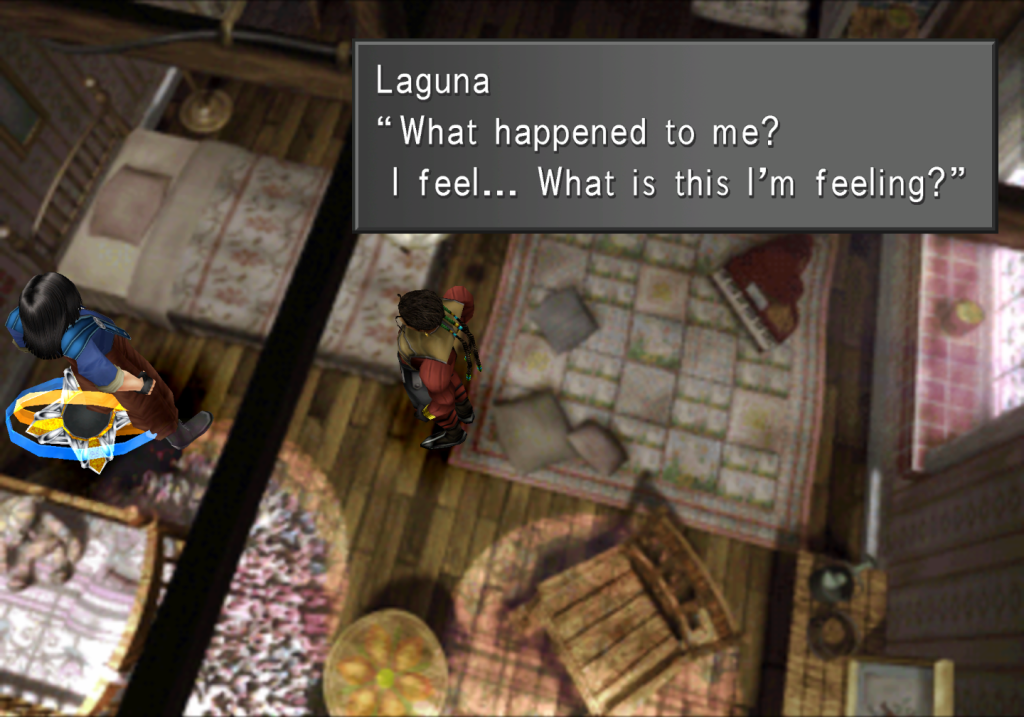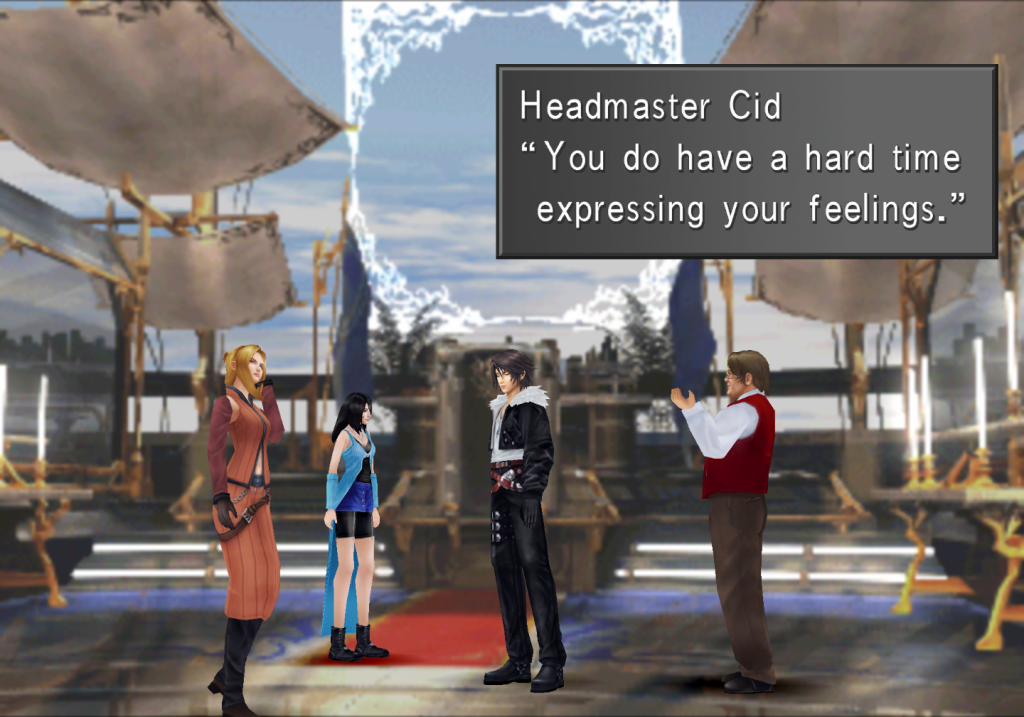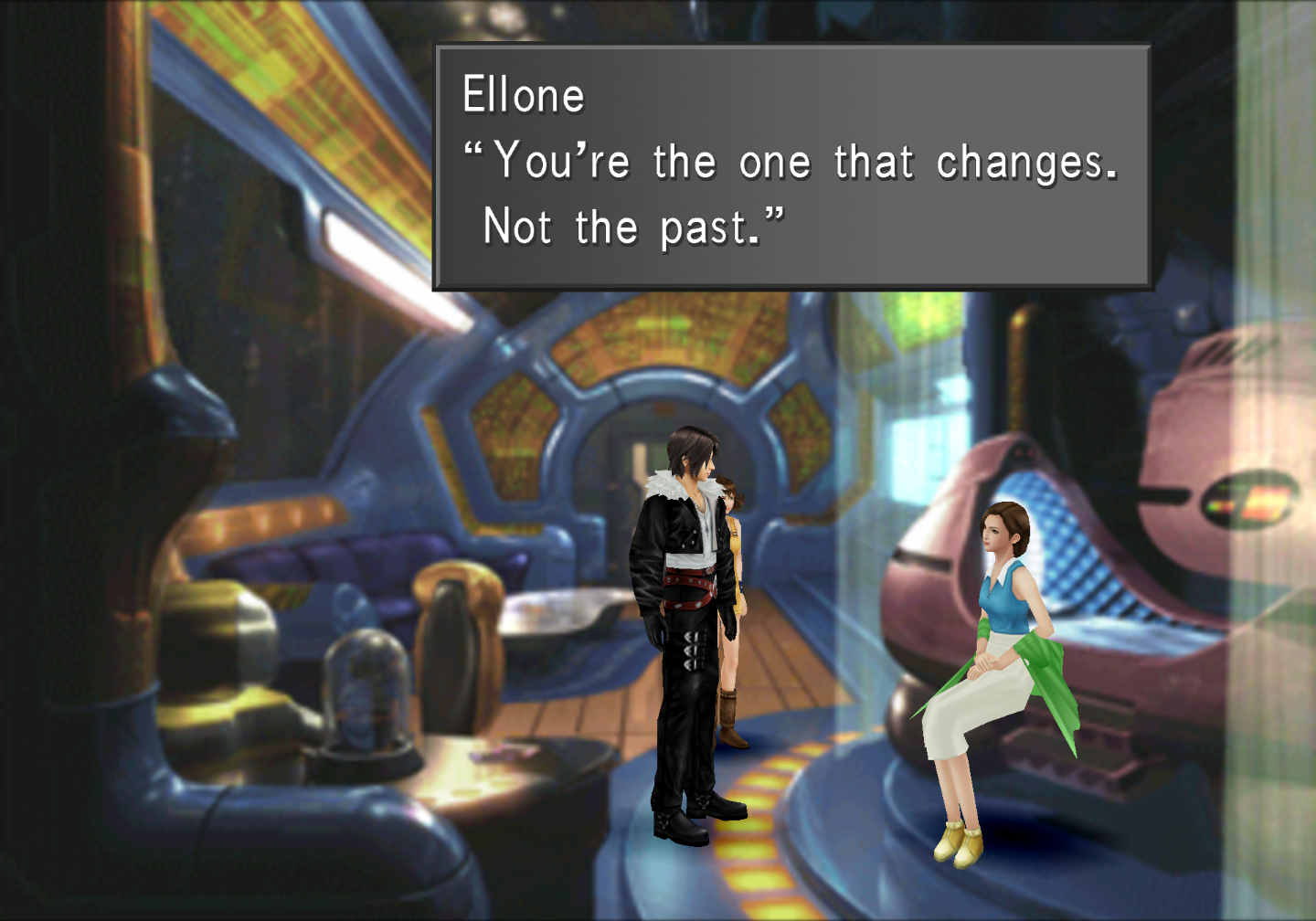I’ve played Final Fantasy VIII all the way through twice: first when it came out, when I was around 10 years old, then again in 2022 at the point of a major change in my life. I loved it both times, but I loved it for different reasons.
When I first played FF8, I was drawn to how over-the-top it was. Balamb Garden! Esthar! The GF animations! The Devour spell! Angelo! Edea’s headdress! A world where science and magic are indistinguishable! I can, have, and will gone on about how much I love this. Especially at a young age, I loved getting lost in weird and extreme worlds. I did really enjoy Final Fantasy VII, but FF8 was a step even further. It never got out of my craw.
But the one thing that did NOT stick with me was the story. I thought it was borderline incomprehensible. Until I replayed VIII, I could not have told you anything about the characters, or even about the actual events of the game, just individual scenes. I knew it was a love story, but I thought it was ineffective. That part of the game rolled off me completely. I never felt a connection with Squall or Rinoa. The ending was confusing, and even at the time, I remember thinking, oh well, that didn’t work and wasn’t up to FF7, but I still enjoyed the game.
I think that reflects what I liked about stories when I was younger. I was much more drawn to worlds and ideas than I was by characters. When I wrote my own stories or dreaming up video games that I wanted to make, I always imagined broad strokes of worldbuilding and dramatic scenes; the characters and their motivations were afterthoughts. I loved high concepts. The characters were there to put that world in motion. Not a universal rule, of course, but in hindsight, my preferences fell in that direction.
In my memory, FF8 was an example of how flat a story could be if it tried chasing emotions that it couldn’t deliver. That got reinforced by the criticism over the years that Squall was a whiny emo brat and the characters lacked the depth of other Final Fantasy games, and that the plot made no sense. And so it stayed that way in my mind. It was a wild, brilliant, wacky game unlike anything that had been made before, just one that didn’t hold up to close scrutiny. It was let down by a weak cast, a weak story, and go-nowhere romance.

A lot changed in 20-ish years.
I started therapy for the first time in 2013. It was long overdue for many reasons. One of the biggest was a lingering fear that my friends hated me. I loved my friends but I found myself a little resentful to them and never felt like I was fully accepted. It’s the fear that a lot of people have when they’re younger, the idea that your peers don’t accept you or will leave you behind, and I felt it intensely. There was plenty of exercises and strategies and meditation. And medication.
But more than any of the specific problems I needed to work on, what I found changing most dramatically was my personality. I was, up to that point, someone who always wanted to be the smartest or loudest person in the room. The kind of person who made a big deal about not being religious instead of shutting up about it. The person who was knee-jerk sarcastic and too quick with a friendly insult too often. I was loathe to talk about my feelings or show vulnerability (because I had apparently taken the lessons of coming of age around teenage boys in the early 2000s Midwest to heart). I felt like I had it all figured out and needed everyone to know it. I know that people liked me, but looking back, I’m not a fan of who I was in my early 20s. I wouldn’t have been friends with him.
When I started taking care of my mental health, I found a lot of that falling away. I calmed down. I slowed down. Stopped caring about being right and started listening more. I got comfortable stepping away from social obligations and not thinking about whether people judged me. The years immediately after therapy were rocky and scary, but they also helped me forge meaningful, emotional connections that have stuck with me ever since. I started to find what mattered to me about my friendships and cherished it.
One of my favorite songs is by a local DC rock band called Bad Moves, who did the song “Party With the Kids Who Wanna Party With You.” Even when it feels like the world is on fire, what matters more than anything else are those human connections. There’s a reason I have this album hanging up on my bedroom wall.
Which brings us to 2022. I moved across the country for a new job, and I struggled. I left behind the place where I’d put down roots and went somewhere new, where I barely knew anybody and basically had to start over from scratch. I was lost and terrified. So I played Final Fantasy VIII again.
I had such a different experience this time. I still enjoyed all the big crazy stuff, but I found myself caring much more about Squall and Rinoa. They’ve both had challenging lives and are used to keeping people at arm’s length. Squall has convinced himself that he doesn’t need other people and it’s easy to move without attachment. Rinoa turned her back on her family and has spent her life as an outsider in her own country. But they find each other. Rinoa is more aggressive about trying to pull Squall out of his shell, but it’s not just about Rinoa dragging Squall onto the dance floor. It’s about what they bring out of each other and how they help each other grow up.
There’s been plenty of ink spilled about how the cast of Final Fantasy VIII are whiny high schoolers. Squall’s moodiness has become a running joke on the internet. Just search for “squall whatever” and see what comes up. But this isn’t a game starring moody teenagers. It’s a game about moody teenagers.
Everything with time compression, the sorceresses, the Lunar Cry? Fithos Lusec Wecos Vinosec? That’s all exciting, but it’s not the story of Final Fantasy VIII. The love story IS the story. This is a game about Squall and Rinoa’s relationship. This is a game about the power of love, set against the background of a wild cosmic war between sorceresses traveling through space and time. It’s about their growth, which is something you necessarily have knowledge of as a 10-year-old.
At the end of the game, when Rinoa goes through time compression to save Squall, it’s not just about rescuing him because he’s the hero. The victory isn’t that they’ve defeated Ultimecia and it’s time to go home, like Cloud saying “welp time to go” after defeating Sephiroth. They’re finding each other at the edge of time and existence. When reality breaks down and this pocket of the universe is on the verge of ripping itself apart, the true victory is that, with apologies to Rihanna, they found love in a hopeless place.
Final Fantasy VIII is not meant to be analyzed literally. All the ridiculous plotting has an almost legend-like quality to it. The truth of the game isn’t about how time compressions works. It’s about emotional truth. When the stupid orphanage twist happens, yes it’s a far-fetched coincidence. But that is not what matters! What matters here is that there is something deeper that binds these characters, that their fates are intertwined in a way that can feel in their hearts. It’s why it’s important that Rinoa and Squall’s love is an echo of what happened with Julia and Laguna, because even if it’s weird to think about that on paper, it’s about the same hearts beating across different periods of time. There’s a romanticism to the story that defies logic and literal narrative. It is a game that invites all sorts of Cinema Sins-style needling at its implausibility and plotholes and other incurious dismissals, but it holds up to scrutiny because if you’re poking holes in the story, you don’t understand what it’s really about.
It is not lost on me that my personal growth has allowed me to appreciate another side of this game. Not just this game, but stories in general. I’ve found myself investing more in stories about characters, about their growth, not just ones that have larger-than-life stuff happening in the background. I think that’s a sign of maturity, and arguably that’s what I needed to understand what they were trying to do with Final Fantasy VIII.
The short version of this story is that in order to appreciate Squall… I became Squall.


